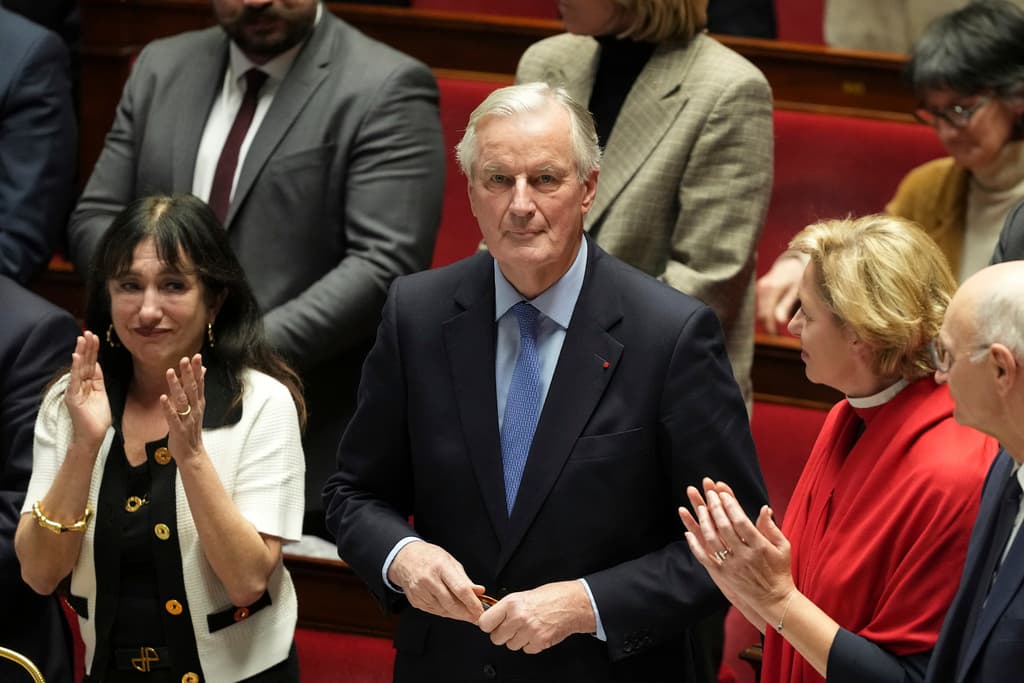Goodbye, Barnier: France’s Prime Minister Loses a No-Confidence Vote and Government Falls, Throwing the Country Into Chaos
President Macron due to address the nation as the minority government led by his hand-picked premier is toppled.

Paris may not be burning, but France is the stage of a major political drama after a no-confidence vote Wednesday by the national assembly toppled the minority coalition of the prime minister, Michel Barnier.
Galvanized by disdain for President Macron and emboldened by disputes over an unpopular budget that only on Monday Mr. Barner tried to ram through the assembly without a vote, parties on both the right and the far left of the political spectrum joined forces to topple Mr. Barnier and his cabinet.
The coordinated maneuver will automatically trigger the resignation of Mr. Barnier and his cabinet members, the first time this has happened in France since 1962. It takes Europe’s second-largest economy, already reeling from heavy deficit spending, into uncharted territory.
It leaves Mr. Macron no alternative but to find a new prime minister — for the second time after parliamentary elections in July led to a deeply divided parliament with no party holding a majority and where Mr. Macron’s own Renaissance party has not only no mandate, but is seeing its legitimacy diminish by the hour.
It was Mr. Macron’s move, foolhardy in hindsight, to have snap elections in June that culminated in Wednesday’s drama. It features the far-right National Rally party and the even farther-left France Unbowed.
Speaking on TF1 television soon after the no-confidence motion was approved by 331 votes (the minimum necessary was 288), the National Rally’s Marine Le Pen said, “There was no other solution than this solution,” adding that she made the choice to censure the Barnier government in order “to protect the French.” She added that Mr. Barnier “did not listen to the opposition when he constructed his budget.”
In a jab at critics who warned that a censure motion would be financially bruising for France, Ms. Le Pen, a fervent nationalist but not a free market conservative, said, “All the fear-mongering that we have been hearing for two days is going to age badly and it will age badly quickly.”
She proffered still more drama: While Mr. Macron will now have to choose a new prime minister, Ms. Le Pen said that she intends to “allow” Mr. Barnier’s successor to “work” on a new budget unhindered.
Who will take over as prime minister? Various names have already been floated, but a new poll shows that the president of the National Rally itself, Jordan Bardella, would be the most popular choice. That would not sit well at all with Mr. Macron, however; he has done his best to keep the National Rally at arm’s length during his political career.
The president is doubtless aware that Ms. Le Pen, having run for president three times, still has her eyes on the country’s highest office when Mr. Macron’s term ends in 2027. Yet the pace of events is quickening, and the calls for Mr. Macron are growing louder by the hour.
Writing on X after the vote, Jean-Luc Mélenchon of France Unbowed declared: “Even with a Barnier every three months, Macron will not last three years.”
The current head of France Unbowed’s parliamentary group, Mathilde Panot, went two steps further. “Now is the time for Emmanuel Macron to go,” she said in front of the national assembly after the vote, adding: “Finally, the Barnier government has fallen along with its violent budget.”
She also took aim at the National Rally, saying that it was of “no use, except wasting us two months, since we presented a first censorship in October.”
That is true — and underscores just how volatile and unpredictable this moment is for France. For Ms. Panot, “the only sovereign in democracy is the people, who can decide at any time that we can change history. The chaos is not us, it’s Emmanuel Macron who has impoverished the country for seven years.”
President Macron, for his part, is insisting he will serve the rest of his term. During a trip to Saudi Arabia earlier this week, he said discussions about him potentially resigning were “make-believe politics.”
The Elysee Palace confirmed that Mr. Macron will be addressing the French nation on Thursday night.
Before the vote that will now see his ouster, Mr. Barnier told the assembly: “This no-confidence motion … will make everything more serious and more difficult. That’s what I’m sure of.”
About that, at least, he is très correct.

